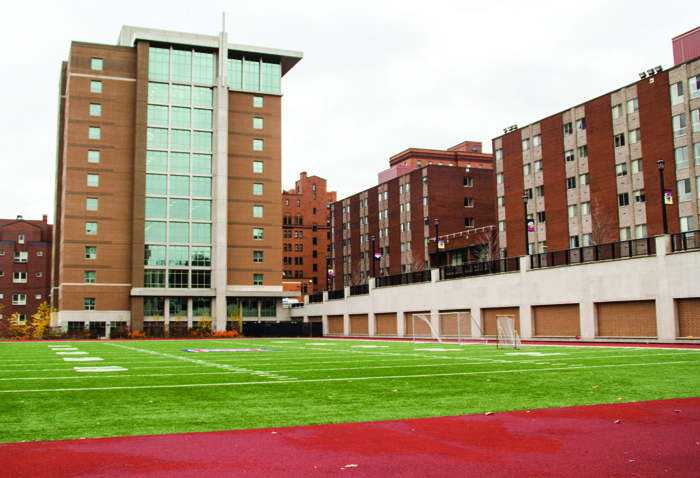
A butterfly lands on one of campus’ many flowers. Duquesne was recently recognized as being one of the top green colleges in the nation by The Princeton Review. The guide scored Duquesne a 82 out of 99 for its environmentally friendly policies.

A butterfly lands on one of campus’ many flowers. Duquesne was recently recognized as being one of the top green colleges in the nation by The Princeton Review. The guide scored Duquesne a 82 out of 99 for its environmentally friendly policies.
Michael Marafino | Staff Writer
10/05/17
As of Sept. 27, Duquesne University is recognized by The Princeton Review for its grand efforts toward environmental sustainability. It was recognized in the article Guide to 375 Green Colleges. Duquesne was commended for its policies on campus, environmental goals and career options in environmental science, environmental management and ecology.
According to The Princeton Review’s website, the rankings are based on whether students have quality living on campus that is healthy, how the school prepares students to work in a green economy, and how environmentally-friendly the policies at the school are. Duquesne received a score of 82 out of 99 possible points.
“We strongly recommend Duquesne University and the other fine colleges in this guide to the many environmentally minded students who seek to live at green colleges” Robert Franek, senior vice president-publisher at The Princeton Review said to the Duquesne Times.
“Among more than 10,000 teens and parents who participated in our 2017 College Hopes and Worries Survey, 64 percent told us that having information about a school’s commitment to the environment would influence their decision to apply to or attend the college,” he said.
Duquesne students display their care for environmental sustainability through many organizations. For instance, the student club Evergreen promotes environmental sustainability on-campus and off-campus throughout Pittsburgh, according to their page on the Duquesne University website. The club is commended for its activities with Facilities Management to encourage those on campus to recycle, and they educate people on the sustainable additions to campus life.
The Evergreen club won the College and University Green Power Challenge for the Atlantic 10 Conference in 2015, according to the Duquesne University website. The club even holds bi-weekly clean-up groups which go to Uptown Pittsburgh and throughout campus picking up litter in order to better the state of living in the area.
The University attributes its goals toward environmental sustainability to the faith-based community. The Sustainability section of Duquesne’s website describes the university’s dedication to being eco-friendly.
“Achieving the goals of sustainability … is one of the principal ways that we have been able to transform respect for the integrity of creation into action, and honor our Catholic founding in the Spiritan tradition.”
The website notes that Duquesne takes on environmental sustainability as a responsibility for protecting the earth and all creation in order to subdue environmental issues and climate change. It is a part of Duquesne’s Spiritan heritage to care for the environment through lessening consumption of natural resources and promoting sustainability, according to the site.
“Being included on the Princeton Review’s Guide to Green Colleges recognizes our upholding the University’s mission to serve God by serving students,” David Chismar, supervisor of energy management and forecasting for the Department of Facilities Management, said.
Chismar commented on the dedication of the facilities staff.
“Facilities management staff work hard every day to be responsible stewards of the resources provided to us in a way that demonstrates to our Duquesne family that it is possible to be sustainable—even on an urban campus,” he said. “We are grateful to be recognized for our efforts, and we will continue to find ways to be more sustainable and to educate the next generation so that they can take the lessons and examples of Duquesne out into the world.”




